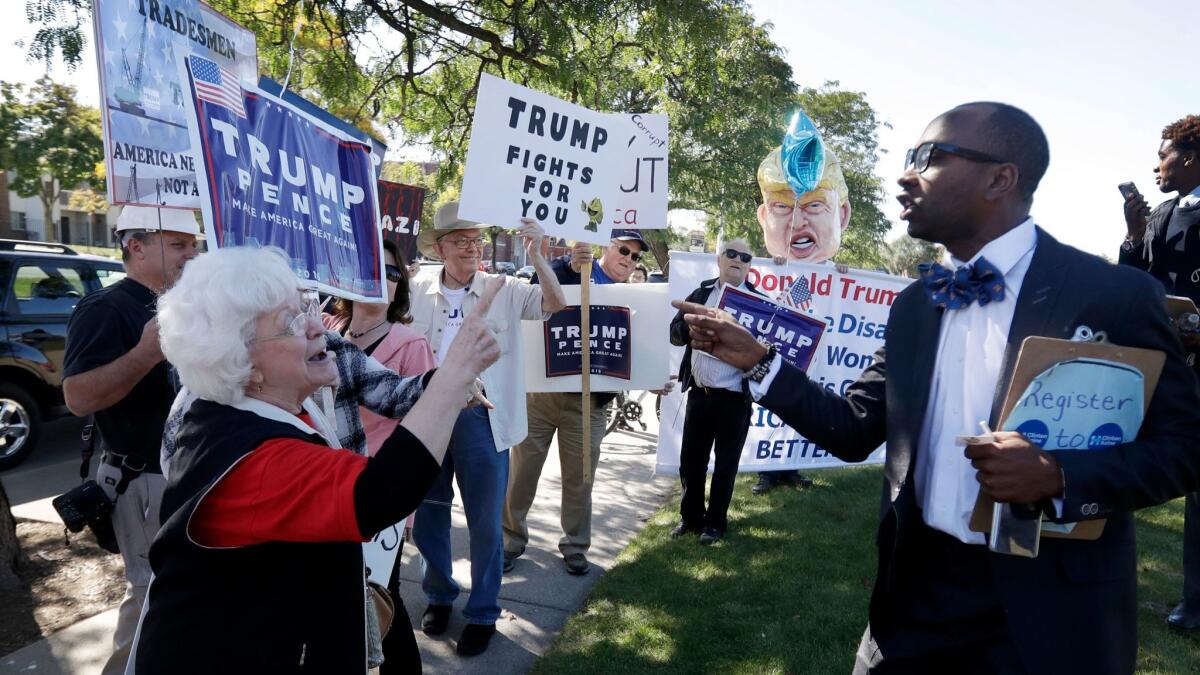Presidential politics has increased job stress and sapped workers’ productivity, psychologists say

- Share via
Last year’s presidential campaign seemed to intensify the political divisions among Americans, and our workplaces were hardly immune. A new report from the American Psychological Assn.’s Center for Organizational Excellence details several ways the animosity from the campaign trail made its way into our professional lives — often to the detriment of workers.
Here are some of the key findings:
Politics has fueled more workplace conflicts since the election
Since the election:
- 54% of people discussed politics at work
- 15% of people argued about politics with a co-worker
- 31% of people saw or overheard co-workers arguing about politics
- 24% of people avoided some of their co-workers because of their political views

Political discussions in the workplace have made it more difficult for people to get things done
Since the election:
- 26% of people said political talk at work made them feel tense or stressed out
- 18% say political talk led to an increase in workplace hostility
- 15% of people said it was more difficult for them to get their work done
- 17% of people said workplace teams were less cohesive because of politics
- 13% of people said the quality of their work suffered

Workplace political talk can affect men and women differently
Women
- The proportion of women who argued with a co-worker about politics rose from 4% during the campaign to 10% after the election.
- The proportion of women who said political discussions made them less productive at work increased from 7% during the campaign to 12% after the election.
- The proportion of women who said the quality of their work suffered rose from 5% during the campaign to 9% since the election.
- Political talk at work made 17% of women feel tense or stressed out during the campaign season. That rose to 25% since the election.
Since the election, these problems have affected both Democrats and Republicans
Republicans
- 23% of Republicans said political discussions at work have made them feel tense or stressed out
- 15% of Republicans said they have argued about politics with a co-worker
- 22% of Republicans said political talk has made them feel more cynical and negative while they’re at work
- 20% of Republicans said the discussions have made it harder for them to get their work done
- 17% of Republicans said the quality of their work has suffered as a result

Political talk in the workplace is more disruptive for younger workers than older ones
Older workers
- 14% of Gen Xers and 5% of baby boomers have argued with a co-worker about politics in the wake of the election
- 9% of Gen Xers and 4% of baby boomers said political talk has made it more difficult for them to get their work done, and 10% of Gen Xers and 2% of baby boomers said the quality of their work has suffered.
- 23% of Gen Xers and 16% of baby boomers have felt tense or stressed out at work because of political conversations there
How the survey was conducted
The results are based on surveys of full-time and part-time workers in the U.S. The surveys were conducted online by the Harris Poll on behalf of the American Psychological Assn.
Data from the campaign season were collected in August of 2016. Of the 2,025 U.S. adults who were interviewed, 927 were working full-time or part-time.
Data reflecting workers’ views since the election were collected in February and March as part of the APA’s 2017 Work and Well-Being Survey. Of the 1,512 U.S. adults who were interviewed, 1,311 were working full time or part time. Responses from self-employed people were not included in the analysis.
Both samples were weighted to better reflect the demographics of the actual adult population in the U.S.
The authors of the report acknowledged that their sampling, weighting and other methods could produce errors. But they said it was not possible to calculate a margin of error for their results.
Follow me on Twitter @LATkarenkaplan and "like" Los Angeles Times Science & Health on Facebook.
MORE IN SCIENCE
Detailed look at the global warming ‘hiatus’ again confirms that humans are changing the climate
Here's the nothingness Cassini heard as it flew through the empty space between Saturn and its rings
This is how hundreds of tons of plastic trash end up in Arctic Ocean




